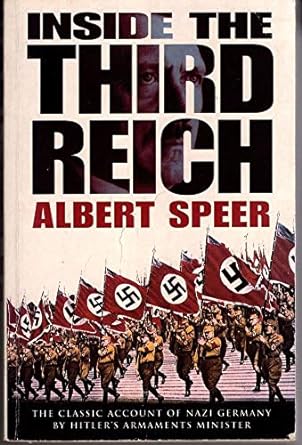Inside the Third Reich
By Albert Speer
Summary

| Content | 8/10 |
| Readability | 8/10 |
| Presentation | 6/10 |
| Ideas | 5/10 |
| Value for money | 9/10 |
| Did it do what it said on the box? | 8/10 |
How do the rankings work?
The Review
A fascinating insight into Nazi Germany
This book is a fascinating insight into Nazi Germany and its key personalities, written by one of them. It contains the first explanation I have ever read of why intelligent and conciable individuals became caught up in Nazism, and is valuable for that reason alone.
The bulk of the book describes key people and events at first hand, and frequently surprises with a very different view to the common one. For example Hitler is portrayed as a bumbling amateur, but with an amazing personal ability to inspire and lead. The Allies’ victory was assured mainly by a catalogue of mistakes by the German leadership, some almost incredible. At the same time, Speer identifies several Allied mistakes which lengthened the war – for example failing to follow through and capitalize on the Dambuster raid, or those targeted at ball bearing production.
Although a long book, it’s well-written and easy to read, and I found it difficult to put down. Amazingly, given the writer and subject matter, there are even some humorous overtones. Related stories and incidents are grouped together rather than in a strict chronology – this takes a little getting used to. More disappointing is the absence of any diagrams or maps. Architecture was Speer’s key skill and Hitler’s abiding interest, and it is frustrating to read a lengthy description of their projects to be told "these plans survive", but not to be shown them.
A reader is likely to end up with some sympathy or even admiration for Speer. His successes as armaments minister early in the War were matched by humanitarian achievements as he led opposition to Hitler’s "scorched earth" policies during the War’s closing stages.
However, the reader must also consider some questions: History is written not necessarily by the victors, but certainly by the survivors. Is the fact that only the relatively decent Nazis survived to write their memoirs cause, effect, or the writers’ own self-advancement?
Similarly, there is little or no mention in the pre-war and mid-war sections of Nazi philosophy and Hitler’s own established hatreds – is this Speer trying to prove how little he knew about the war crimes and genocide?
This is an important book, revealing the other side of the Second World War. History may judge Albert Speer to be one of the few "decent" Nazis. His own book cannot do that alone, but it definitely deserves to be read.
Buy It From Amazon
Amazon.co.uk  |  | Amazon.com
|

 Thoughts on the World (Main Feed)
Thoughts on the World (Main Feed) Main feed (direct XML)
Main feed (direct XML)